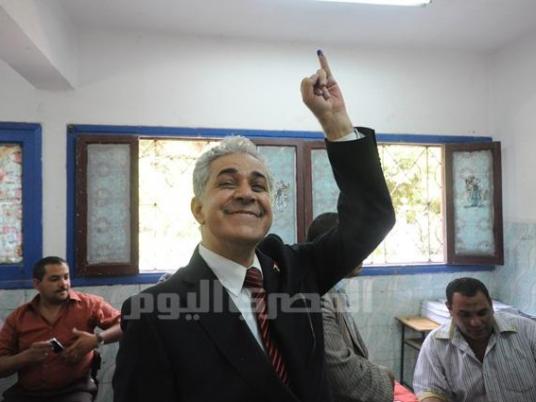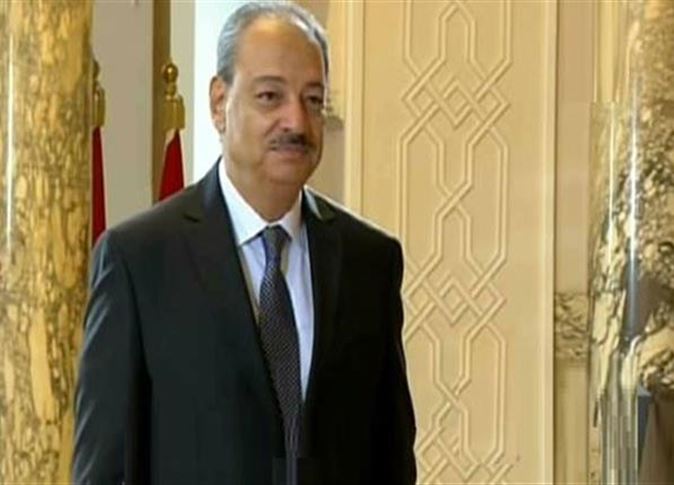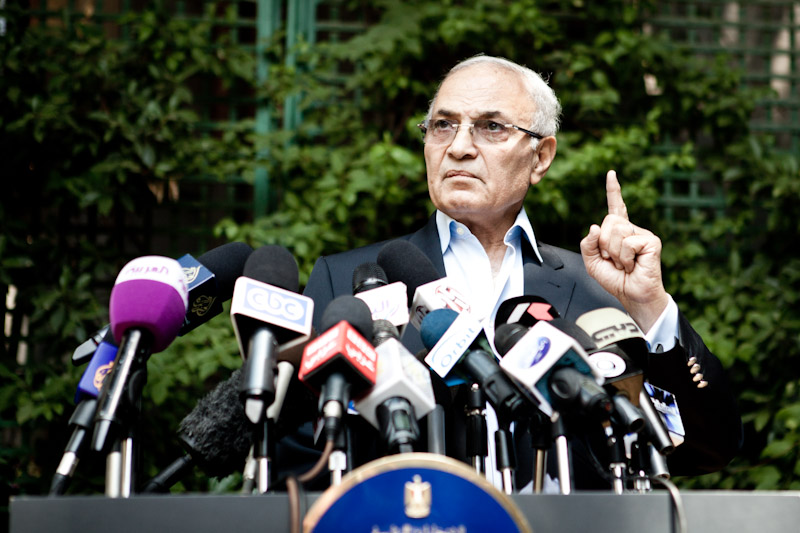
The scene at Hamdeen Sabbahi’s campaign headquarters was tense on Friday as voting results continued to roll in. In the “control room” on the ground floor of a suburban Cairo residential bloc, Sabbahi campaigners, all under 30, smoked and stared at computer screens, digesting the fact that their man had come so close to – if not victory – a shot at it.
A huge cheer erupted at news that a sweeping Sabbahi victory in Alexandria, Egypt’s second largest city, had put the Nasserist candidate ahead of rival Ahmed Shafiq, an official from the very regime that protesters attempted to bring down with a revolution last year.
That moment passed and the waiting resumed.
Until voting started, Sabbahi was largely regarded as an outsider with a limited constituency whose popularity depended on him being neither an Islamist nor a remnant of the old regime.
A frazzled-looking Mahmoud Qandil, legal adviser to the Sabbahi campaign, said that it was clear Sabbahi was in the top three alongside Shafiq and Muslim Brotherhood member Mohamed Morsy from the start of the counting.
The fact that Sabbahi is an ideological alternative to the four other big players in this election: Morsy, Shafiq, moderate Islamist Abdel Moneim Abouel Fotouh and former Foreign Minister Amr Moussa is what made him so attractive to voters, Qandil said.
There were other secular, leftist candidates in the presidential race, including Khaled Ali, a labor lawyer, but none were as well known and liked like Sabbahi nor have his “long history of activism,” Qandil said. Sabbahi has been an opposition activist since his university days in the 1970s.
Sabbahi’s popularity was evident last week when he took a tour through Cairo on an open-topped bus, accompanied by a throng of media and campaigners, his campaign song, “My Vote is for Hamdeen Sabbahi” blaring out from speakers.
After adjusting to the site of the large vehicle bearing down on them, members of the public seemed genuinely delighted to see the Sabbahi bus and even more so to see the man himself.
One microbus driver stopped his vehicle in the middle of a busy Cairo thoroughfare in order to lean his torso out of the window and declare his love for Sabbahi. Others sprinted alongside the bus cheering and waving.
In Sabbahi’s campaign headquarters, volunteer Ahmed Sharaf, from Sabbahi’s hometown of Belteem in Kafr El-Sheikh Governorate, described how Sabbahi helped Sharaf’s sister acquire a room in a Cairo University dorm after the university refused to give her one because she wears a full face veil.
Sitting next to Sharaf, a campaign volunteer described how he had been in a microbus on an errand when he saw Sabbahi’s poster with the aim of just signing an endorsement support of Sabbahi’s presidency bid. He ended up volunteering for his campaign.
Sabbahi’s charisma and man-of-the-people persona – his campaign slogan was “one of us” – accounts, in part, for his success, says Michael Wahid Hanna a political analyst.
“He talks a language that’s not foreign or alien and doesn’t promote new policies,” says Hanna. “His message is a reinvigorated form of an old politics that Egyptians, apparently, can still relate to.”
Sabbahi’s success is “stunning” because his campaign was “pretty rudimentary,” lacking the financing and robust organization of opponent Abouel Fotouh.
Critical to Sabbahi’s success, Hanna suggests, is the backlash against Islamist forces.
“It is hard to draw definitive conclusions, but it appears that a big strand of people who didn’t want Islamists or feloul voted for Sabbahi as an acceptable alternative,” Hanna suggested. He added that the low turnout –initial estimates put it at 40 percent – worked somewhat in the favour of non-Islamist candidates, because the Islamist vote in the presidential elections was significantly reduced compared to numbers in November’s parliamentary elections.
Activist Akram Ismail suggests that Sabbahi was “successful in the new political environment that was opened up after the revolution” and “the only figure who opened up a leftist space that people wanted to vote for.”
“The revolutionary youth and young people inspired by the revolution gathered around Sabbahi and began campaigning for him independently,” Ismail said, adding that Sabbahi’s success puts an end to claims by Arab leftists that an Islamic figure is more acceptable to Egyptians than a secular one.
The crisis that has emerged out of the presidential election results – extreme political polarization and an Islamist versus former regime binary – may be in part due to the number of candidates who competed.
“Egyptian politics are divisive, but not as divisive as this result suggests. The distribution of votes over five candidates allowed a somewhat unrepresentative and more divisive outcome than where Egyptian politics really is,” Hanna said.



